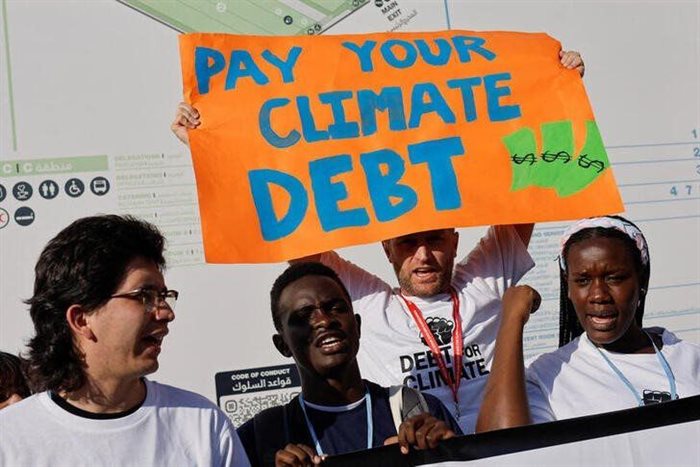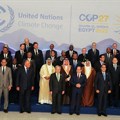Curb on rights weakens Egypt's climate talks, campaigners say

The small, muted protest took place in an area designated for demonstrations by summit host Egypt, where public protest is effectively banned and activists have endured a crackdown on dissent which they say leaves no room to operate.
The young demonstrators, who said they were from Sharm el-Sheikh, held up slogans asking for protection of coral reefs such as those off the coast of their Red Sea resort, but avoided calling anyone to account over the threat their environment faces from development and climate change.
Authorities say protests at the United Nations COP27 summit of global leaders in the tightly secured town on the remote southern tip of the Sinai Peninsula can be held "similar to" those at previous climate gatherings.
But campaigners, who see the annual meeting as a crucial platform for raising global alarm over climate change and pressuring governments to act, say restrictions on civil society since the overthrow of Egypt's first democratically elected president in 2013 cast a cloud over the conference.
They also undermine accountability and transparency needed to ensure countries step up their commitments to tackle the climate crisis and meet those promises, the campaigners say.
Demonstrations in the Blue Zone
Climate action "requires more people on the street, more voices, more independent research, more independent reporting, more accountability when climate obligations are not met," said Tirana Hassan, Human Rights Watch's acting executive director.
"That's not going to happen under governments such as the Egyptian government which is excluding civil society, independent journalism and academia," she told a meeting in Sharm el-Sheikh this week.
Apart from gatherings such as the coral protest at the designated protest zone this week, most demonstrations have taken place in the summit's central 'Blue Zone' which for the duration of the talks falls under the responsibility of United Nations, not Egyptian authorities.
Those demonstrations are governed by restrictions, which one activist said applied to all climate summits but which were being stringently observed in Egypt, that protesters should not seek to point a finger of blame.
"We're gonna march this way. But a reminder, no mentioning of country, no mentioning of person and no mentioning of a company in your chants and in your speeches," Reuters footage showed a protest organiser telling marchers in the Blue Zone.
Egypt's COP27 ambassador Wael Aboulmagd said protests in the Blue Zone were "completely under the command and control of the United Nations... We instituted a parallel system, which is comparable but slightly different," he said.
The regulations aimed to "provide a peaceful environment for everyone to express their views freely."
Hunger strike puts rights on agenda
On the eve of the summit, aimed at agreeing plans to avoid the worst impact of climate change, Egypt's most prominent prisoner Alaa Abd el-Fattah said he was escalating his hunger strike, putting Egypt's human rights in even greater focus.
Egypt has faced criticism from rights groups over its crackdown under President Abdel Fattah al-Sisi, the former military leader who took power after a wave of protests against a Muslim Brotherhood president nine years ago.
Hundreds of supporters of the Brotherhood were killed and thousands arrested.
Sisi, who was elected president in 2014, says security measures were needed to stabilise Egypt.
Since then, Human Rights Watch's Hassan said Egypt had been through "one of the harshest crackdowns we have seen", and climate activism was mainly limited to "safe environmental topics" such as recycling and renewable energy.
"If you wanted to look at some of the thornier and critical issues in Egypt like water security, industrial pollution, environmental harm, real estate development, tourism development, agri-business, or one of the most shadowy variants - Egypt's vast and opaque military business activities - that reality becomes very risky," she said.
Egypt's delegation at the talks did not respond to a request for comment on assertions from Hassan and others that the government excludes campaigners, curbs discussion of some climate issues, and has prevented debate outside the summit.
'Blank cheque for more repression'
Amnesty International head Agnes Callamard criticised the decision to hold the summit in Egypt, saying that failure to uphold human rights undermined its work, including talks this week on providing funds to poorer countries to pay for loss and damages caused by climate change.
In the absence of accountability which comes with open discussion, awarding compensation to repressive governments for climate damage "is a blank cheque for more repression", she said.
Asad Rehman, director of the UK anti-poverty group War on Want who has helped coordinate activists at previous climate conferences, said the restrictions in Egypt had made it harder for activists to press leaders to do more for poorer countries.
"When civil society is contained here, less people come. That, of course, reduces our capacity," he told Reuters. "There is absolutely nothing taking place outside the official venue. There is no people's summit, there are no demonstrations."
Despite those criticisms, some delegates argued that there was a benefit to holding the summit in Sharm el-Sheikh to shine a light briefly on Egypt's record.
"This is a huge opportunity," Egyptian journalist and human rights advocate Hossam Bahgat said. "Egypt has been forgotten because there has been a degree of normalisation of repression.
"We very much needed this spotlight."
Source: Reuters

Reuters, the news and media division of Thomson Reuters, is the world's largest multimedia news provider, reaching billions of people worldwide every day.
Go to: https://www.reuters.com/






